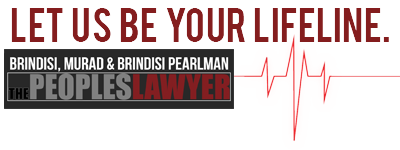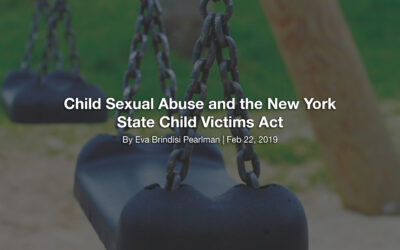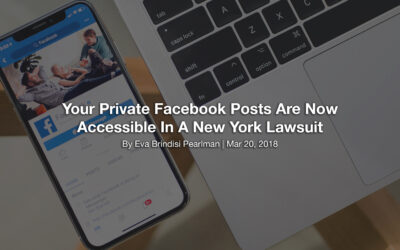We all hear over and over again to be careful about what you post on Social Media. This is especially true for a person involved in any type of litigation, whether it is criminal, matrimonial, or civil litigation. Facebook, Twitter, YouTube, Vine, Instagram, Pinterest, and Snapchat are all being used as resources in litigation to locate relevant information, especially in personal injury cases.
Courts generally concur that there is no real privacy interest in content uploaded to Social Media websites, whether the user has privacy settings or not, because the “information” is put out and intended to be shared with “someone”. Courts have held with respect to “tweets”, there is no reasonable expectation of privacy, which are in effect “gifted” unto the world.
New York Courts have held that private and public posts on Social Media, if they contain relevant information to the litigation, are discoverable and many times can lead to admissible evidence at trial. In particular, a party’s posting of information on social media sites, if relevant, may not be shielded from discovery merely because a plaintiff or defendant used privacy settings to restrict access.
As an example, in one case, a defendant driver claimed he wasn’t drinking alcohol prior to being involved in an intersection accident after which he was ticketed for failure to yield the right of way at a STOP sign. However, a search of his Social Media account showed him posting pictures of drinking before the car accident. This was used to damage the defendant driver’s credibility at his deposition and will likely have an impact on a jury at trial.
Likewise, a plaintiff involved in a personal injury case who claims he has a lower back pain due to whiplash, a knee injury, and trouble walking will hurt his credibility if his Social Media posts reveal information to the contrary. In a case involving this exact issue, an injured plaintiff claimed he couldn’t walk long distances or attend football games for his favorite NFL team. He lost all credibility when his Facebook posts showed him tailgating and attending numerous games post-accident.
Insurance defense lawyers and insurance companies have the right to view the public portion of a person’s Social Media profile or public posts even if the person is represented by a lawyer. Many insurance defense firms are also using software/programs to help locate all Social Media relevant to a case, and which preserve the material to avoid staff having to appear as a witness to authenticate the materials located online. These programs are designed to collect content from leading Social Media networking sites such as Instagram, Facebook, Twitter, LinkedIn, and Tumblr. In addition, these programs can capture and instantly search content from websites, webmail, and YouTube.
So, the warnings about making your life an open book on Social Media once again hold true, especially if you are involved in a lawsuit. Your posts, tweets, videos, and pictures are permanently recorded for posterity, and are easily verifiable.
Some legal scholars have argued that evidence from Social Media has a great chance of unfairly prejudicing and misleading a jury even though these postings can be very deceiving. Oftentimes, social media posts are exaggerating and glorifying things happening in a person’s life. Most people try to present themselves in a positive light on Social Media.
As such, the injured person who posts a picture of herself enjoying an activity can and most likely will form a lasting impression in a juror’s mind. Like the old adage says… “A picture is worth a thousand words”. As such, that picture has the chance of unfairly prejudicing and misleading a jury into thinking the person is not injured.
In reality, this may not be the case at all. The person may have just been trying to portray themselves in a positive light to their family or friends on Social Media. Not too many people post about how sad their lives are, how difficult even the most ordinary daily activities are to perform, or the pain and mobility issues they are having post-accident. This is why it is not prudent to engage, at all, in posting on Social Media sites following your accident.
If you have any questions regarding Social Media and how it may affect your personal injury claim, contact an experienced New York accident lawyer, such as the lawyers at Brindisi, Murad, Brindisi & Pearlman. We will help you understand Social Media and how it may apply to your case so you can make the decisions that are right for you. Contact Brindisi, Murad, Brindisi & Pearlman, The People’s Lawyer today.
Share this blog with your friends…

CONTACT US FOR A FREE CASE EVALUATION
Related Blogs
Child Sexual Abuse and the New York State Child Victims Act
Child sexual abuse has devastating effects on the victim, their loved ones, and our whole community. The statistics of child sexual abuse are frightening. Listed below are just a few: • 1 in 6 boys and 1 in 4 girls are victims of sexual abuse by the time they reach 18...
Your Private Facebook Posts Are Now Accessible In A New York Lawsuit
These days, almost everyone has a social media account, especially a Facebook profile. We may think we are safe by putting our settings on "private" to prevent strangers from viewing our posts and photos of family and friends. However, in a recent NY lawsuit,...
5 Safety Tips To Avoid Accidents & Injuries This Halloween
Halloween is here once again and children in our community are gearing up for a fun night of trick or treating. As parents, we know that while this holiday is great fun for kids, their safety is the most important thing. Today, we’re talking about dangerous...
Injured In An Accident?
Contact BMBP Today!






BRINDISI, MURAD & BRINDISI PEARLMAN
UTICA OFFICE
Utica, NY 13501
OFFICE HOURS
MONDAY – FRIDAY
9AM-5PM


